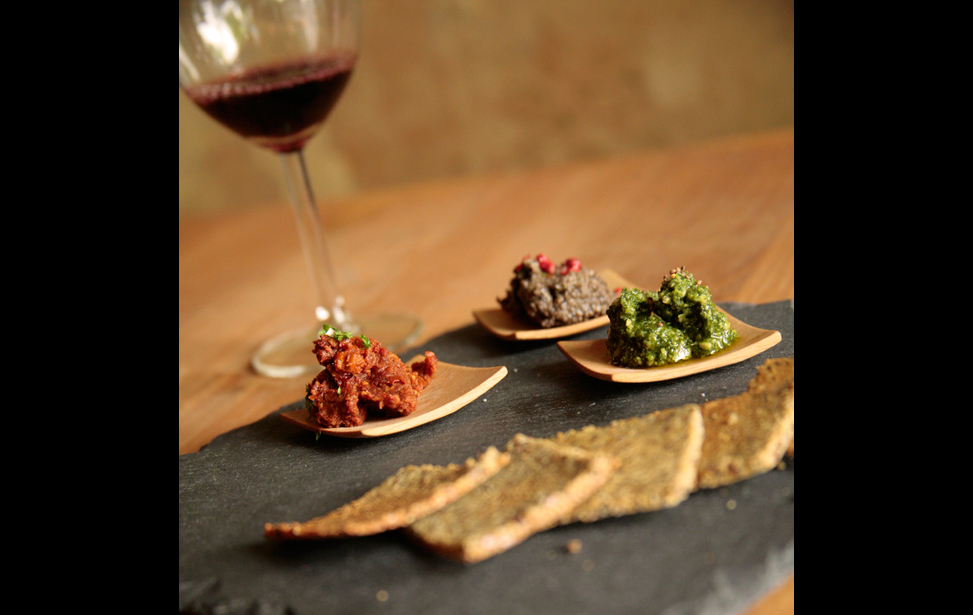In The Realm Of The Senses And Savages
Dining like a sophisticated caveman and in complete darkness
Three Unique Restaurants
BERLIN, GERMANY – In the visually saturated world where appearance counts more than content and quickly prepared food with high carbohydrate and low nutrition value is consumed in large quantities, there are still places that represent a sanctuary for the body and soul. Berlin boasts a few culinary temples where you can let yourself be reminded that you are after all a wholesome being blessed with more than just one sense.
When one thinks of the Stone Age diet, images of huge chunks of raw or half-cooked meat, a few meager roots, and perhaps a handful of small wild fruits combined with bad table manners might spring to mind. But when you visit Berlin’s Sauvage, the first restaurant in Europe based on Paleolithic cuisine, you couldn't be further from the truth.
The owners, a Belgian-Brazilian couple Boris and Rodrigo Leite Poço, noticed the health benefits – such as higher energy levels, stronger immune system and general well-being – that the hunter-gatherer diet brought them and decided to share it with other enthusiastic Berliners. The candlelit interior with ocher walls, simple wooden chairs and tables, and a couple of huge canvases with an earthy color palette give the impression of having entered a cozy cave (as seen in photo 1).
The menu, which changes on a weekly basis, consists of two or three starters, four main courses, and two kinds of dessert, all of which more or less follow the principles of Paleolithic diet. That means no grains, starches, dairy products or sugar; only organically produced vegetables, herbs, fruits, nuts, and seeds, grass-fed meats and wild fish, all very fresh and tasty, served in an aesthetically pleasing manner (as seen in photos 2 - 4).
Aesthetics is, however, something you needn’t worry about when dining in complete darkness. The restaurants unsicht-Bar and Nocti Vagus offer you the opportunity of enhancing the four senses you might be neglecting in the world of chronic voyeurism, as Susan Sontag would say.
Axel Rudolph, the founder of Germany’s first dark restaurant, unsicht-Bar in Cologne, used to work with sound. ”I created sound installations in public places that improved the environmental sound quality. Back in 1988 I was asked by an institution for the blind to create an exhibition in total darkness that would show sighted people how blind people interpret and experience the acoustic environment,” he explains. The exhibition, which was called Dialogue in the Dark, included a small bar where snacks and drinks were served and consumed in complete darkness. The dark restaurant unsicht-Bar was his next step in exploring the world of food and blindness.
After choosing your meal in the gently illuminated entrance hall (as seen in photos 5 and 6), you are escorted to your table by a waitress or waiter who is, due to their visual impairment, completely at home in darkness (as seen in photo 7). Once you’re safely seated, you can rest your tired eyes and enjoy the rich spectrum of taste, smell, and touch, of the food that is never overly cooked or processed in order to retain the richness of flavor and smell, and discover unknown qualities of your partner’s voice.
Date chutney on radish carpaccio and baby spinach, mousseline of freshwater crab on a bed of marinated chard, or a duo of rump fillet and stuffed breast of veal on beetroot puree with honeyed carrots are only a few examples from the mouth-watering menu of the Nocti Vagus restaurant. Unsicht-Bar’s bill of fare, on the other hand, avoids actual food names and uses poetically enigmatic descriptions instead. How about A taste of Aztecan masculinity on wavy green and voluptuous red bedding for appetizer? And some Upper nobility embraces the French underworld in a deep dark red river of sensuality for main course?
Photos 1 - 4 courtesy of Sauvage
Photo 5 courtesy of unsicht-Bar GmbH, Köln
Photos 6 - 7 courtesy of Nocti Vagus














